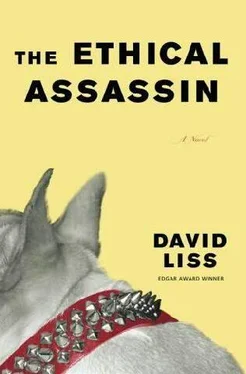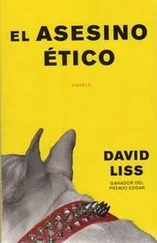I took the light from Melford’s hand and approached the nearest pen. The pigs, which had stood in a kind of trance of labored breathing, woke at my approach and squealed. They tried to push back, away from me, but there was nowhere for them go to, so they squealed more fervently, more shrilly. I hated to frighten them, but I needed to see.
What I thought I’d observed in the sporadic flashes of the strobing fans was now all too clear. Many of the pigs- most, perhaps- had heavy red growths erupting from under their short hair. Ugly, knotted, red tumorish things that jutted with malevolent force like misshapen rock formations. Some of the growths were along their backs or sides, and the pigs appeared to more or less ignore them. Others had them on their legs or near their hooves and so had trouble moving. Some had them on their faces, near their eyes or on their snouts, so they couldn’t close their mouths or open them fully.
I backed off. “What’s wrong with them?” I asked Melford. “I mean, holy shit. It looks like a medical experiment or something.”
“It is, in a way,” Melford said with the clinical calm I was coming to expect of him. “But they’re not the test subjects. We are. No animals, except maybe social insects, were meant to live in such close quarters, but the hog farmers pack them in because the closer you can get them, the more hogs you have to raise in a single space. It’s a matter of being cost-effective. But the pigs- and let’s forget about their pain and misery. Most of them are probably insane by this point anyhow. But on a purely physiological level, the pigs can’t stand it, their bodies can’t take the physical stress, and that makes them vulnerable to disease. So they get pumped full of medicines, not to make them healthy, you understand, but to allow them to survive their confinement and reach slaughter weight. I’m talking about mammoth quantities of antibiotics.”
“I don’t get it. Isn’t there like an inspector or something who will say they’re too diseased for human consumption?”
“That would be the USDA- the same agency that’s in charge of making sure that we don’t eat diseased animals is also in charge of promoting the consumption of American meat. It’s bad business to make meat safe and treat the animals humanely, because that costs money. If the meat costs too much, well, that makes voters unhappy. So if an inspector actually gets it in his head to try to stop this craziness, the farmers- the guys they are supposed to regulate- file complaints, and next thing you know, that inspector is reassigned or out of a job. The result: No one opens his mouth, and sick animals get sent to the slaughterhouse, where they are often dismembered while still alive, the visibly diseased bits are cut off, and their flesh, steeped in antibiotics and growth hormones, arrives on the dinner table.”
“So, what are you saying? That our food supply is tainted and no one knows but you?”
“Lots of people know, but people don’t worry about it because they are told everything is fine. But the statistics are staggering. Seventy percent of the antibiotics we use go into livestock- meat and dairy animals that people end up consuming. Most of the population is walking around with low dosages of antibiotics in them, allowing bacteria to evolve into antibiotic-resistant strains. Even if I didn’t care how the animals are treated, I would still have to worry about the plague that’s coming to wipe us all out.”
“I don’t believe it,” I said. “If it were really that dangerous, then wouldn’t someone do something about it?”
“Things don’t work that way. Money greases the wheels. If there were a plague and it were linked back to factory farming, then someone would do something about it. Until that happens, too many people are making too much money. Our senators and representatives from farm states say that there’s no evidence that intensive farming hurts anyone. Meanwhile, they’re taking zillions of dollars of campaign contributions from these giant agribusinesses that destroy family farms and replace them with Nazi monstrosities.”
“It can’t be that bad,” I said.
“It’s amazing. You’re like a walking poster child for ideology. How can it not be that bad? You are looking right at it. It is that bad. And if your own eyes don’t convince you, how can you ever be convinced of anything ever except what you already believe?”
I had no answer.
“Look,” he continued, “even if you have no sympathy for the suffering of the animals, even if you’re too shortsighted to care about the long-term health risks of tainted meat, then think about this: There are consequences, terrible, human consequences, soul-crushing consequences, from being asked to not think about something as basic as our own survival because big corporations need to keep up their bottom lines.”
It was a good point, and I didn’t have a response. “Let’s get out of here.”
***
Outside, even in the midst of all that stench, I didn’t feel like moving. We stood in the clearing while I stared at the building in numb disbelief.
“Imagine what you’ve just seen,” Melford said, “only multiply it by millions. Billions. It makes you wonder, doesn’t it.”
“Makes me wonder what?” I asked. My voice sounded hollow.
“If it is ever ethical to sacrifice human life for the sake of animal life.”
Even in the face of what I’d witnessed, I didn’t hesitate. “No,” I said.
“Are you sure? Let me ask you something. Say you come upon a woman being raped. The only way to save her from rape is to kill her attacker. Is killing him the right thing to do?”
“If I had no other choice, of course.”
“Why? Why is that morally acceptable?”
“Because I value the right of a woman to escape rape over the right of a rapist to live.”
“Good answer. But what about the right of an animal to escape torture? You don’t value that right over the right of a torturer to achieve pleasure or profit?”
“No. Look, what goes on in there is terrible, Melford. I would never say otherwise. But there is still a basic divide between people and animals.”
“Because animals have a lesser sense of themselves?”
“That’s right.”
“And what about a severely retarded person- one who, as far as we know, is not any more aware than a monkey? Does he only have the rights of a monkey?”
“Of course not. He’s still a human being.”
“And receives the rights thereof, yes? The umbrella that includes the imagined or the typical person must also include the lowest of us. Is that it?”
“Yeah,” I said. “That’s it.”
“But is that umbrella natural and right and just, or is it just what we tell ourselves for our ethical and economic and sensual convenience? Why shouldn’t that umbrella include all creatures who are capable of feelings and emotions? If it’s wrong to torture a pig, then it’s wrong. To say that it is no longer wrong when it’s lucrative- because we want valuable exports and cheap meat at the supermarket- is insane. Ethics cannot be bound up with profit. It’s like permitting contract killing while making murders of passion illegal. Is cruelty motivated by capital less evil than other kinds of cruelty?”
“I understand what you’re saying, but you can’t convince me that there’s no hierarchy. Animals might feel emotions, but they don’t write books or compose music. We have imagination and creativity, and that means human life is always more valuable than animal life.”
“Always? Let’s say there’s a dog, a heroic dog. A dog who has saved the lives of countless people through acts of bravery. Maybe a firehouse dog who rescues babies from a fire. And let’s say there is a convict on death row, one you know is guilty of horrible murders. He’s escaped on the eve of his execution and he’s taken the dog hostage. The next morning, the authorities discover his hideout. They know they can recapture him, but in doing so, the dog will surely be killed. Or they can have a sniper take out the convict and save the dog’s life. What’s more important, the convict who has killed numerous people and who would already be dead had he not escaped, or the dog, who has only done good?”
Читать дальше












